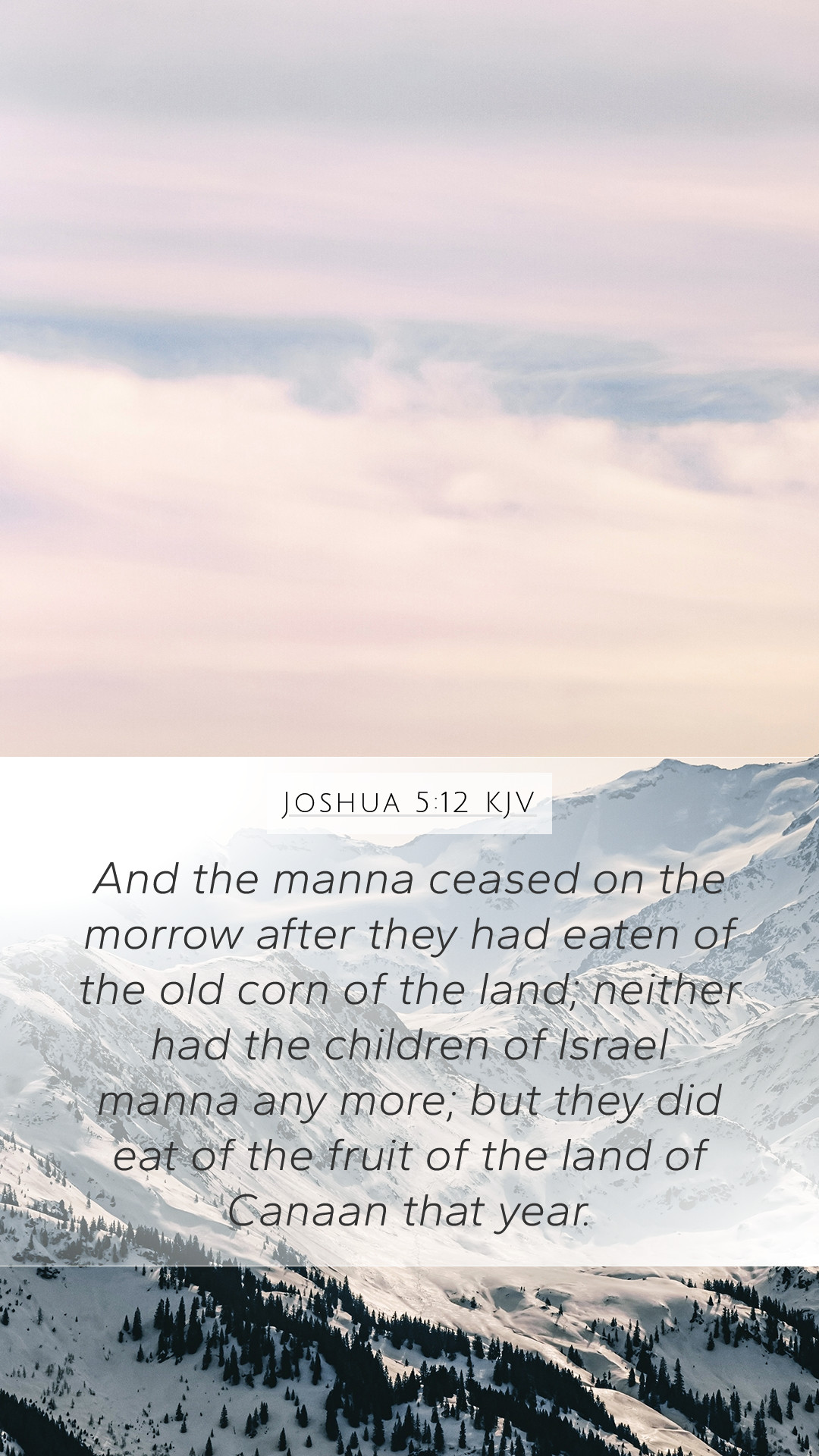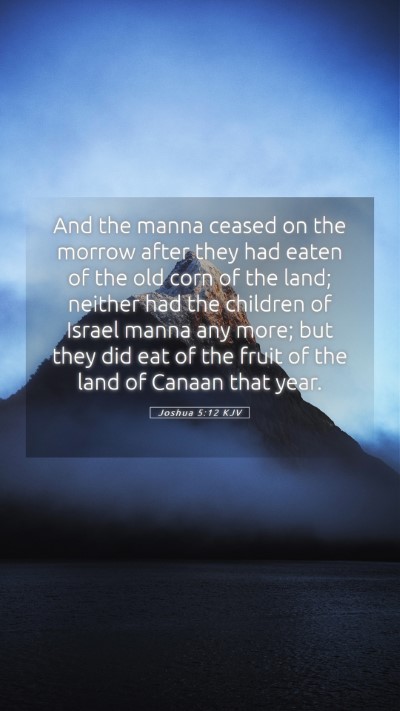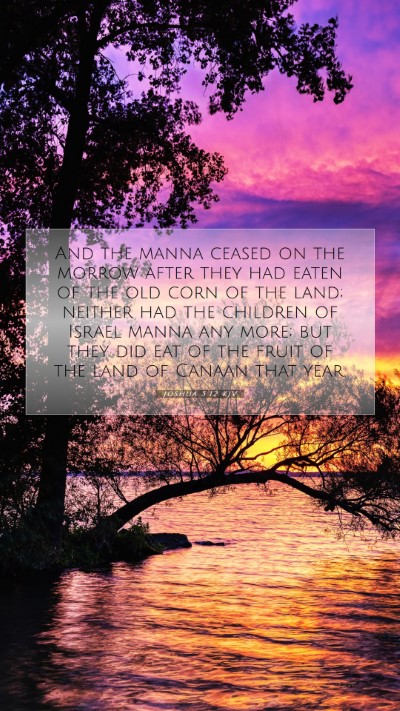Old Testament
Genesis Exodus Leviticus Numbers Deuteronomy Joshua Judges Ruth 1 Samuel 2 Samuel 1 Kings 2 Kings 1 Chronicles 2 Chronicles Ezra Nehemiah Esther Job Psalms Proverbs Ecclesiastes Song of Solomon Isaiah Jeremiah Lamentations Ezekiel Daniel Hosea Joel Amos Obadiah Jonah Micah Nahum Habakkuk Zephaniah Haggai Zechariah MalachiJoshua 5:12 Meaning
What is the meaning of Joshua 5:12?
And the manna ceased on the morrow after they had eaten of the old corn of the land; neither had the children of Israel manna any more; but they did eat of the fruit of the land of Canaan that year.
Joshua 5:12 Bible Verse Meaning
Bible Verse Meaning and Interpretation of Joshua 5:12
Joshua 5:12 states, "And the manna ceased on the morrow after they had eaten of the old corn of the land; neither had the children of Israel manna any more; but they did eat of the fruit of the land of Canaan that year." This verse marks a pivotal transition in the journey of the Israelites as they move from dependence on divine provision in the form of manna to the abundance of the Promised Land.
Overview of the Verse
This verse signifies the cessation of manna, the miraculous food provided by God during the Israelites' 40 years in the wilderness. With the Israelites now in Canaan, the land flowing with milk and honey, there was no longer a need for this miraculous sustenance. Instead, they began to partake of the products of the land that God had promised to them.
Bible Verse Commentary
According to Matthew Henry, this transition symbolizes the end of one era and the beginning of another in Israel's history. The destruction of the old (manna) and the acceptance of the new (produce of Canaan) reflects the fulfillment of God's promises and the importance of recognizing the change in divine provision. The people had to adjust their mindset from relying on daily heavenly food to cultivating their land and utilizing the gifts God had prepared for them.
Albert Barnes notes that the provision of manna was specific to the wilderness experience, highlighting the unique journey of the Israelites. With the arrival in the Promised Land, there was a shift towards agricultural sustenance, which required their active participation in God’s blessings. Barnes emphasizes the importance of this change, as it signifies a maturation in their faith and dependence on God's promise rather than supernatural sustenance.
Adam Clarke provides insight into the significance of this moment when he mentions that the cessation of manna was not merely a loss, but a gain for the Israelites. They are entering into rest, a season of blessing and abundance, showing that God rewards faithfulness. Clarke explains that this represents a form of spiritual growth, moving from a miraculous provision to everyday blessings from God through their labor in the land.
Spiritual and Practical Lessons
From Joshua 5:12, several significant spiritual lessons can be gleaned:
- Transition Phase: Life is filled with transitions; often God takes us from seasons of dependence (like the manna) to seasons of responsibility (like harvesting the land).
- Faithfulness and Provision: God's provision can change, but His faithfulness remains. As believers, it is essential to recognize and adapt to how God is working in our lives.
- New Beginnings: The end of one thing often opens the door to new experiences and growth. This verse encourages us to embrace change as part of our spiritual journey.
- Active Participation: God has given us tools and resources; we are called to engage with them actively as we cultivate the blessings He has for us.
Cross-References
This verse is interconnected with several other scriptural references that deepen our understanding:
- Exodus 16:35: Discusses the provision of manna throughout the Israelites' journey in the wilderness.
- Deuteronomy 8:3: Reminds the Israelites that man does not live by bread alone, but by every word that proceeds from the mouth of God, reflecting on their journey's sustenance.
- Numbers 11:4-9: Highlights the Israelites' complaints about manna and longing for the foods of Egypt, showcasing their struggle with divine provision.
- Psalms 105:40: Celebrates God's provision for the Israelites during their wilderness experience, acknowledging His blessings over time.
- Hebrews 3:18-19: Reflects on Israel's failure to enter the Promised Land due to unbelief, contrasting their past with God's current blessings.
Conclusion
Joshua 5:12 encapsulates a significant moment for the Israelites as they transitioned from supernatural sustenance to the fruits of their labor in Canaan. Understanding this scripture opens avenues for deeper Bible verse meanings and Bible verse interpretations, emphasizing the faithfulness of God and the importance of recognizing and adapting to His provisions in our lives.
This study serves as a reminder for those engaging in Bible study groups or online Bible study platforms about the importance of understanding the historical context and the spiritual applications of God's Word, providing insights into our personal and communal faith journeys.


